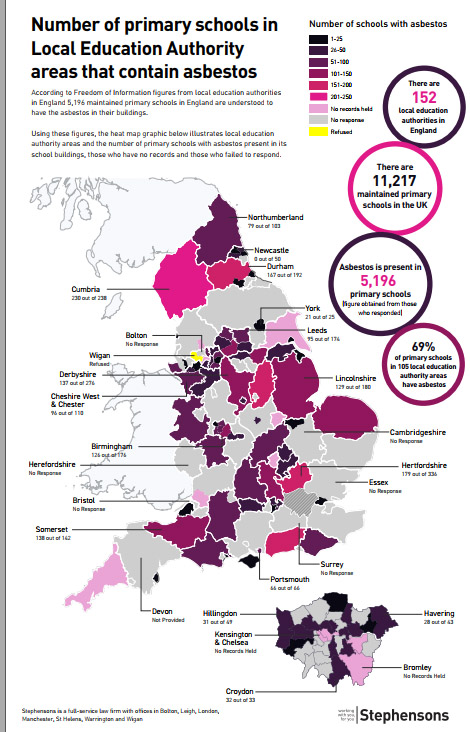Today -July 4th – is National Mesothelioma Day and this year the charity Mesothelioma UK is drawing attention to the risk to children in primary schools.
Politicians and environmentalists are rightly concerned about the quality of air in our cities and the traffic pollution around schools where parents leave their engines idling while waiting to collect pupils at the end of the school day. But there is a menace that lurks behind the plaster, in the damaged roofs, rotten windows and broken ceiling tiles of primary schools built or repaired roughly between the years of 1940 to 1980.
 Mesthelioma is a cancer caused by breathing in asbestos dust and while asbestos is banned in the UK, it is still to be found in many homes, schools and offices.
Mesthelioma is a cancer caused by breathing in asbestos dust and while asbestos is banned in the UK, it is still to be found in many homes, schools and offices.
Last year the Department of Education asked all schools to report how much asbestos was in their buildings. Nearly a quarter (23%) of schools failed to respond by the February 2019 deadline. A Freedom of Information (FOI) request by Stephensons Solicitors LLP received replies from just 69% of the 152 local education authorities in England but the results give cause for concern:
• 5,196 maintained primary schools are likely to contain asbestos
• A further 3,791 schools could contain asbestos
• At least 319 teachers have died from mesothelioma since 1980
• 205 of these deaths have occurred since 2001 (source: National Education Union)
• Academies and free schools are not required to report to their local education authority on asbestos because they are outside their control
Kate Sweeney, partner in personal injury at Stephensons, pointed out that asbestos is found in many primary schools because the buildings are very old: ‘Parents and teachers have a right to know if asbestos is present and what measures are being taken to manage exposure.’
There is no safe level of asbestos and the effects will not show up for several decades so Stephensons and Mesothelioma UK are calling for all schools and local education authorities to publicly disclose if asbestos is on the premises and the measures being taken to manage it.
Liz Darlison, Head of Services at Mesothelioma UK, said: ‘Sadly, the UK has the highest incidence of mesothelioma in the world.’
See the NEU fact file: https://www.teachers.org.uk/edufacts/asbestos

 The mental health charity The Shaw Mind Foundation (SMF) and HealthUnlocked, a social network for health, have joined forces to promote HeaducationUK
The mental health charity The Shaw Mind Foundation (SMF) and HealthUnlocked, a social network for health, have joined forces to promote HeaducationUK St John Ambulance believes that every young person should have the chance to learn vital lifesaving skills. Their research shows that seven out of 10 pupils wouldn’t know what to do if someone they knew was hurt. Children want to learn these new skills and parents are keen too. In fact, 95% of parents agree that these skills should be taught to secondary school pupils.
St John Ambulance believes that every young person should have the chance to learn vital lifesaving skills. Their research shows that seven out of 10 pupils wouldn’t know what to do if someone they knew was hurt. Children want to learn these new skills and parents are keen too. In fact, 95% of parents agree that these skills should be taught to secondary school pupils. Teresa Pearce, Labour Party MP for Erith and Thamesmead, proposed an Emergency First Aid Education Bill so that first aid, including CPR, would be taught in every state-funded secondary school.
Teresa Pearce, Labour Party MP for Erith and Thamesmead, proposed an Emergency First Aid Education Bill so that first aid, including CPR, would be taught in every state-funded secondary school. I found that £500 goes a long way in Bangkok as my prize paid for four nights in a hotel, a half day guided tour of the city, canals and temples plus a full day visit to the River Kwai at Kanchanaburi to see the famous Bridge over the River Kwai, the Allied War Cemetery and Museum and a trip on Death Railway followed by an elephant ride.
I found that £500 goes a long way in Bangkok as my prize paid for four nights in a hotel, a half day guided tour of the city, canals and temples plus a full day visit to the River Kwai at Kanchanaburi to see the famous Bridge over the River Kwai, the Allied War Cemetery and Museum and a trip on Death Railway followed by an elephant ride. here is loads of good stuff for people with dyslexia: Debra Charles is doing one of the keynotes. She is
here is loads of good stuff for people with dyslexia: Debra Charles is doing one of the keynotes. She is As someone who uses Autocorrect on Word and types entirely in abbreviations, I am keen to see Global AutoCorrect which works with all programs from presentation software to emails, the web and social media. It frustrates me when I have to type every letter on Facebook. Maybe now I won’t have to.
As someone who uses Autocorrect on Word and types entirely in abbreviations, I am keen to see Global AutoCorrect which works with all programs from presentation software to emails, the web and social media. It frustrates me when I have to type every letter on Facebook. Maybe now I won’t have to.


